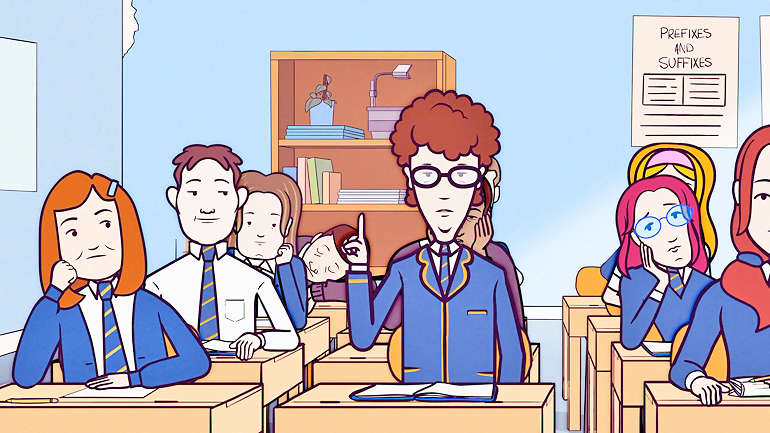Ann Hornaday
THE WASHINGTON POST – In the clever, hauntingly disturbing My Old School, filmmaker Jono McLeod spins an absorbing yarn of near-epic proportions, revisiting an astonishing story from his youth that manages to tap into Gen X nostalgia and sheer WTH-ery while engaging deeper issues of aspiration, class resentment and deception.
In 1993, McLeod and his junior-year classmates at Bearsden Academy, in one of Glasgow’s tonier suburbs, welcomed a new student to their ranks: Brandon Lee, an auburn-haired, preternaturally mature teenager from Canada who nursed ambitions to go to medical school.
Interviewed 25 years later, McLeod’s friends draw a vivid picture of the misfit whose backstory only grew more mysterious as it was revealed: His recently deceased mother was an opera singer who educated her son on the road; his father was a prominent academic in London. But McLeod doesn’t just rely on the memories of his peers: Brandon himself is interviewed, although he refuses to allow McLeod to show his face, for reasons that become clear in one of My Old School’s many startling reversals.
Brandon’s reticence leads to the first of many creative workarounds that give My Old School as much visual interest as narrative propulsion: McLeod enlists Alan Cumming to portray Brandon, lip-syncing to his recorded voice with such seamlessness that he quickly disappears into the role. Filling in gaps with animated sequences reminiscent of the primitive cartoons of the time, McLeod creates a film as layered and contradictory as Brandon’s story itself: brimming with sweetness and naivete one moment, only to swerve into much murkier territory the next.
For the first half-hour or so, My Old School relates a heartening tale, wherein Brandon begins to make friends, even changing one or two lives: He reaches out to a Black classmate in biology class, helping him study and making him a part of the school’s cliquey social circle. He teaches another about ’80s bands like Husker Du, Television and Red Lorry Yellow Lorry, turning him almost instantly into a cool kid.

“He fundamentally changed my musical taste,” the reformed techno-nerd said today.
Most pivotally, Brandon agrees to star in the class production of South Pacific, delivering a boffo performance that cements his status as a big man on campus.
So far so John Hughes-worthy, as My Old School promises to be a testament to the power of acceptance in the face of class snobbery, tribalism and random adolescent cruelty.
But the worm turns, and over the next hour, McLeod doubles back to interrogate the narrative we’ve just heard, examine the darker truths behind even the happiest memories and ever-so-gently question the ethics of Brandon’s concept of secondary education.
Maybe too gently: During one of the most painful interludes in My Old School, a female classmate confronts the fact that she’s been misremembering a moment with Brandon for most of her life, realising in real time that what seemed benign would now be categorised far differently.
Although McLeod lets the moment sink in with appropriate discomfort, he never forces Brandon himself to reckon with his behaviour. Although the jokey anecdotes and animated sequences give My Old School buoyancy and momentum, that tone sometimes fights with content that isn’t nearly as larky as the film portrays it.
Still, there’s no denying that Brandon and his exploits make for an engrossing, often witty meditation on what it means to grow and evolve.
There’s a genuinely moving sequence late in My Old School when McLeod films his former classmates as they are now, pursuing dramatically divergent careers and leadingly seemingly happy lives.
Even though Brandon had the wildest story, McLeod makes it clear that these funny, thoughtful, remarkably unremarkable people were his real subjects all along.







